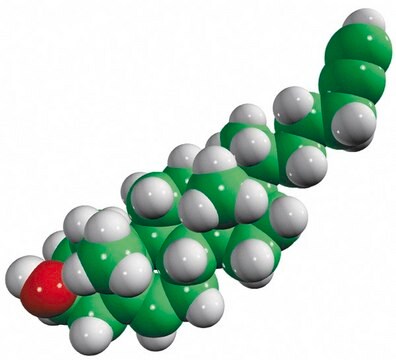推薦產品
形狀
powder or solid
分子量
PCL average Mn 5,000
PEG average Mn 5,000
顏色
white to off-white
蛋白質二硫鍵異構酶
≤1.3 (by GPC)
儲存溫度
−20°C
應用
Allyl-poly(ethylene glycol)-b-poly(ε-caprolactone) is a functionalized, amphiphilic, diblock copolymer composed of a hydrophilic PEG block and a hydrophobic PCL block. These biodegradable, biocompatible polymers can self-assemble to form nanoparticles, such as micelles and polymersomes, in both aqueous and non-aqueous media. Due to these properties, these polymers are widely used in polymeric nanoparticle formulation to achieve controlled and targeted delivery of therapeutic agents (e.g. APIs, genetic material, peptides, vaccines, and antibiotics). Additionally, well-defined nanoparticles with tunable size and properties can be prepared by altering the molecular weight ratios between hydrophilic and hydrophobic blocks, as well as by controlling formulation parameters. The allyl functional group on the PEG chain enables rapid and facile surface functionalization, allowing for these materials to be used in applications such as targeted drug delivery.
儲存類別代碼
13 - Non Combustible Solids
水污染物質分類(WGK)
WGK 3
客戶也查看了
Xiaoqiang Yang et al.
Journal of biomedical materials research. Part A, 86(1), 48-60 (2007-10-18)
To overcome multidrug resistance (MDR) existing in tumor chemotherapy, polymeric micelles encoded with folic acid on the micelle surface were prepared with the encapsulation of a potent MDR modulator, FG020326. The micelles were fabricated from diblock copolymers of poly(ethylene glycol)
Cem Varan et al.
Beilstein journal of nanotechnology, 8, 1446-1456 (2017-09-14)
Background: Brain tumors are the most common tumors among adolescents. Although some chemotherapeutics are known to be effective against brain tumors based on cell culture studies, the same effect is not observed in clinical trials. For this reason, the development
文章
Professor Nicola Tirelli (Istituto Italiano di Tecnologia, Italy) highlights the microfluidic-assisted method for fabricating well-defined and reproducible nanoparticles for drug delivery research.
Professor Nicola Tirelli (Istituto Italiano di Tecnologia, Italy) highlights the microfluidic-assisted method for fabricating well-defined and reproducible nanoparticles for drug delivery research.
Professor Robert K. Prud’homme introduces flash nanoprecipitation (FNP) for nanoparticle fabrication, which is a scalable, rapid mixing process for nanoparticle formulations.
我們的科學家團隊在所有研究領域都有豐富的經驗,包括生命科學、材料科學、化學合成、色譜、分析等.
聯絡技術服務
